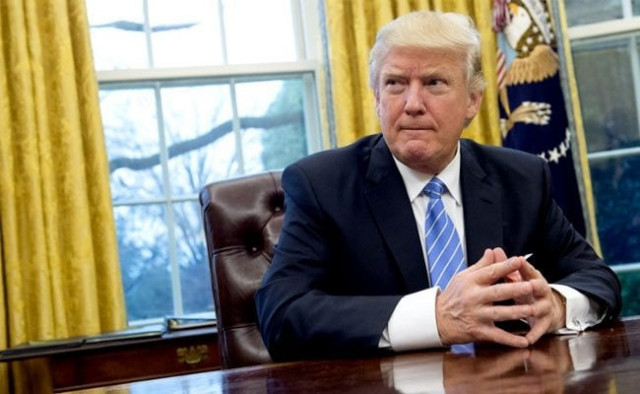How Trump will shape Pakistan-US ties
India, Afghanistan will continue to define the troubling relations between Washington DC and Islamabad

US President Donald Trump. PHOTO: AFP
The perturbed outgoing US president chose India and Afghanistan for his final reassuring words for he leaves behind the controversial “Pivot to Asia” policy and a war-torn country which is anything but chronically volatile. Neither did he call premier Nawaz Sharif nor did the 44th US president visit Pakistan in the last eight years. Evidently, there’s a sigh of relief in Islamabad at Obama’s exit from the White House. Will Trump be any better despite the choppy air that surrounds him? Or what else can go wrong?
Pakistan offers to work with Trump
Enormous suspicion about Trump’s mindset and cabinet picks notwithstanding, Pakistan will try to remain open for business with the administration in Washington DC. Abandoning relations with America in favour of erratic and financially crumbling Russia does not sound like a sane move. Sure, bilateral relations declined ominously over the last decade partly due to divergence of interests, and sheer absence of long-term vision on the Pakistani side. While it was nearly impossible for Pakistan to frustrate India’s improving relations with the US, the foreign ministry acted in reactive and fire-fighting manner instead of a proactive and pragmatic one. Islamabad has an opportunity to halt its retreat that eased Delhi’s marathon advance. For all practical purpose, India-US relations will remain de-hyphenated from Pakistan’s. The Cold War-era allies won’t be strategic partners of any ilk no more; not only because India will do America’s bidding but also because of China’s Gwadar access. Ideally, the Trump-Pence tenure must be of affirmative recovery and stability in bilateral relations sans further dependence for military hardware.
The elephant in the room, however, will be India’s brinkmanship against Pakistan. With enflamed rhetoric comes deployment of India’s strategic and tactical resources along occupied Jammu and Kashmir as well as much of the 3,000-km border. Unable to deliver on its promises, the Modi government will resort to reckless populism. Will the forecast of “limited war” in April or onwards as per the India’s “Cold Start” doctrine stand true? Islamabad maintains no “no-first-use policy” while maintaining robust tactical and strategic nuclear arsenal. China has already been filling the power void during the last decade.
Obama’s Afghanistan interest was driven more for India’s sake than a genuine desire for peace and reconstruction, which can’t realise without substantive material and political assistance from Pakistan. Irrespective of the president occupying the White House, as long as the policies are seen motivated to serve India’s interest, Islamabad will pursue pragmatic defiance. Thus, the Trump administration ought to revisit the policy and seek a more affirmative and constructive relationship. A proactive engagement will be vital on Pakistan’s part for the State Department to determine its role as being part of the problem or the solution in Afghanistan.
Zardari urges Trump to do what Obama 'never did'
In the worst-case scenario of confrontation and sanctions, the US will push Pakistan further closer to assertive Russia. Regardless of Delhi’s posturing against Beijing to milk the west for investment and military hardware, its moves are practically directed against encircling and isolating Islamabad. It is not yet clear as to how far can Trump go to let Putin expand Russia’s global outreach. The US establishment, however, will be wary of Moscow strengthening multi-faceted relations with Islamabad.
Pakistan not only needs to de-hyphenate itself from Afghanistan but also China. Delhi has already been trumpeting Islamabad to becoming Beijing’s sidekick. The Cold War-era mistake of absolute alignment is never to be repeated. Relations with China have never undermined the country’s sovereignty and integrity. Islamabad can strike the requisite balance if it maintains greater transparency in joint projects with China besides an open-door policy for other competitors.
The Trump administration’s protectionist approach will be bitter pill for India, possibly shelving US mega corporations’ plans to relocate in Bengaluru or Gujarat.
The Trump presidency for Pakistan
Lastly, Washington’s position on one-China policy as well as the South China Sea will have implications for North Arabian Sea. The “Pivot to Asia” policy was one of the few bigger blunders of the Obama administration. Not only did he sow the seeds for a global conflict but also left Taiwan, Washington’s ally, more vulnerable. The new regime may review harsh rhetoric of the campaign trail and adopt a more realistic one instead. Trump’s executive order scrapping America’s participation in the Trans-Pacific Partnership last night was good news for China, which instead of attempting to undercut it will now embrace it. Remember, Obama had pitched the bloc to counter China's influence by imposing US-backed labour, environmental and patent protections.
If President Trump goes by his stated policy on China, Pakistan’s shores will not remain so peaceful. When Beijing will be poked in the South China Sea with the help of India, it may possibly respond in kind in the Arabian Sea waters, vital for the US and its allies’ maritime trade.
Naveed Ahmad is a Pakistani investigative journalist and academic with extensive reporting experience in the Middle East and North Africa. He is based in Doha and Istanbul and tweets @naveed360



















COMMENTS
Comments are moderated and generally will be posted if they are on-topic and not abusive.
For more information, please see our Comments FAQ